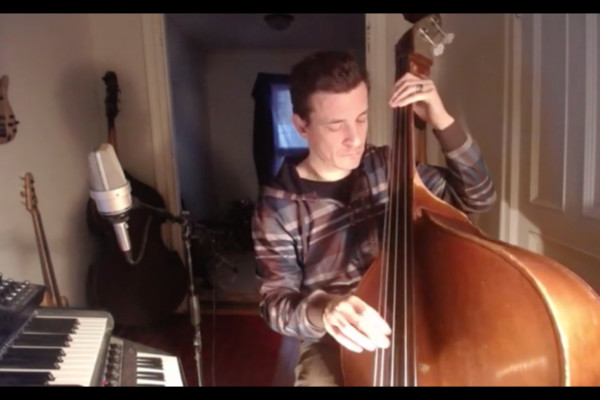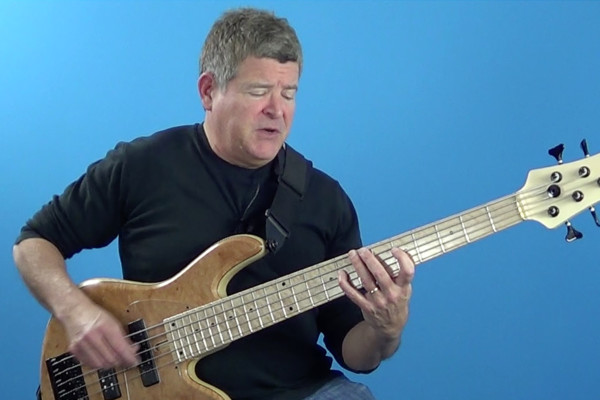Theory Archives
Keep It Groovy: Learn How to Play Journey’s “Don’t Stop Believin’”
In her new “Keep It Groovy” lesson, Ryan Madora digs into the iconic bass line on Journey’s “Don’t Stop Believin’.” If you have any aspiration to play in a bar, wedding, or corporate band, this is definitely a bass line that you need to know.
Bass & Creativity: Dorian Mode
Olivier Babaz is back with his second entry in his “Bass & Creativity” lesson series. In this video lesson, he’s focusing on exploring the sounds, colors, and options through improvisation within the Dorian mode.
Where To Start with Music Theory
A reader sent Damian one of the most honest questions we've seen, focused on his lack of understanding theory and his desire to change that. Check out what Damian has to say on “Where To Start with Music Theory.”
What Scales Do I Use Over a Minor ii-V Progression?
Q: I have a question about minor ii-V’s. In a major ii-V7-I progression, each chord is diatonic to the I chord. The ii chord is Dorian, the V chord is Mixolydian and it resolves to a Major tonic. In a minor ii-V, the 1 would be natural minor, which makes the ii chord Locrian (7th degree of the major scale)...
Talking Technique: Beautiful Practice in Minor
Last July, I published a Talking Technique lesson called “Beautiful Practice“. It recently made a reader’s favorite list for 2016 here on No Treble thanks to your likes, shares, and comments. Thank you for that! The lesson brought together music theory, comprehensive fretboard knowledge, and lots of technique aspects. I thought we’d bring the lesson back with a twist, namely...
How To Apply Your Transcriptions
Q: Can you give an example of how I might explore using the things I’ve transcribed in some way? I’ve been transcribing a lot this year (as a music student), but I’m not sure how to apply it or get anything from it. A: I spent years transcribing tunes, solos, melodies and bass lines before I ever really figured out...
Talking Technique: Beautiful Practice
This lesson is called “Beautiful Practice” for a reason. Our exercise this week creates a lush harmony and texture all while working out our theory and technique at the same time. The theory portion of this week’s lesson is that we’ll be playing diatonic triads in open voicings. If that sounds foreign to you, don’t worry. We’ll be breaking down...
Where to Use Whole Tone and Other Scales
Q: So, do you play whole tone scales over the ?5, and altered scales over the dominant chords. Major chords – do use use whole tone? Minor scales – do use use dorian? or a jazz minor? A: Much of what goes into deciding what scale to use over any given chord is all about the context (what chords are...
Advanced Bass: The Tritone Substitution Matrix
When learning to play your bass, an overkill of theory can often paralyze your results while performing. Many musicians have learned the theory of Tritone Substitution, but when trying to apply this information, they often end up short-changed. In this bass lesson, we’ll cover a simple but direct concept for the immediate application for Tritone Substitution based on the presence...
Ariane Cap Releases Music Theory Book for Bassists
Bassist, pianist, composer and educator Ariane Cap has decided to make understanding music theory easier to understand for bassists in her book, Music Theory for the Bass Player: A Comprehensive and Hands-on Guide to Playing with More Confidence and Freedom. The theory in the book is designed to be approachable, and can even be used by players who can’t read...
Freeing Up Your Walking Bass Lines
Q: I’ve been getting my walking together and have started to become comfortable and natural sounding playing perfectly functional harmonic lines through changes that highlight the harmony well. It’s all just basically chord tones and scalar patterns with occasional chromatic approaches. In sum, I think I’ve passed walking 101 and am ready to move on. When I listen to and...
Developing a Solo Over Chord Changes
Q: I have a question about improvising. If one browses the internet for learning how to improvise on the bass guitar, one can easily find lots of great tips: learn familiar melodies and expand them, learn solos from other instruments and be inspired by others. I would like to know about how to approach improvising using musical theory. In this...










